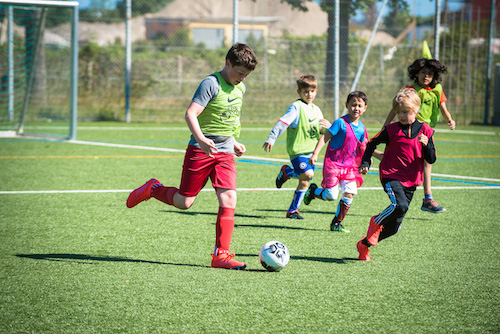
Photo: www.luisfaustino.com
By Steve Long, InterSoccer
Can you put your hand on your heart and say that your child does a whole hour of sport or physical activity, every single day of the week?
If he or she attends school in Switzerland, whether public or private, it is likely that he or she takes part in gym, swimming, walking and other activities on most weekdays during term time. However, on weekends and in the school holidays, the responsibility falls to us parents to make sure that our children are active enough. Suddenly we have to factor entertaining our children into our daily lives, alongside other responsibilities such as work, shopping, cooking and housework. Is it always possible to provide them with the time and circumstances to do this amount of exercise?
Last week the government in my home country of England announced plans to give all children greater opportunities to be active in school, after school, and during weekends and holidays. Research has shown that less than one in five children in England do the recommended daily amount of 60 minutes of physical activity a day, and one third do less than 30 minutes a day.
There are, as yet, no such national figures for children under the age of 10 in Switzerland. But the 2007 Swiss Health Survey revealed that 35% of the population over the age of 15 are insufficiently active, and 16% are entirely inactive. If trends in Switzerland are following those in other European countries, those figures have probably risen in the past 12 years.
While our children have access to things that many of us could never have dreamed about as kids – cheap international travel, instantaneous information and learning via computers and smartphones, daily possibilities to integrate with people from different cultures in multi-lingual environments – perhaps with all the distractions that modern life has to offer, they are less likely to be able to enjoy the basic pleasures of running around outside, with nothing to do but chase a ball until the next mealtime.
Sport and physical activity have many benefits for children, mentally as well as physically. Children who do more exercise and who exercise daily self-report to feel happier than less active children. Being involved in sport also enables children to meet others and make friends, to learn how to keep practising at something in order to get better, and to feel the satisfaction that comes with making progress. Playing in a team can help a shy child to become more confident, and an overactive child to learn to channel his or her energies into a positive outcome, in a controlled way.
Physically, sport helps to develop coordination, balance, speed and flexibility, as well as strengthening the cardiovascular system and muscles. Children who are active are more likely to develop into active adults, which will have lifelong advantages for their health.
A passion for sport develops slowly over time, among children who form happy memories of an active childhood, without undue pressure to win competitively, but simply for the love of playing itself. Patiently providing our children with enough places and times to exercise is probably one of the best things we can do to prepare them for a healthy future.
Author's Bio

Steve Long is CEO of InterSoccer, which offers football courses and holiday camps for two to 13-year-olds in Geneva, Vaud, Basel, Zug and Zurich. Steve first came to Switzerland in 2001 as an event and grassroots manager for UEFA, before co-founding InterSoccer in 2007. He loves all sports, especially football, snowboarding, tennis, golf and mountain biking. Originally from Nottingham, UK, he still supports The Mighty Reds - Nottingham Forest.








